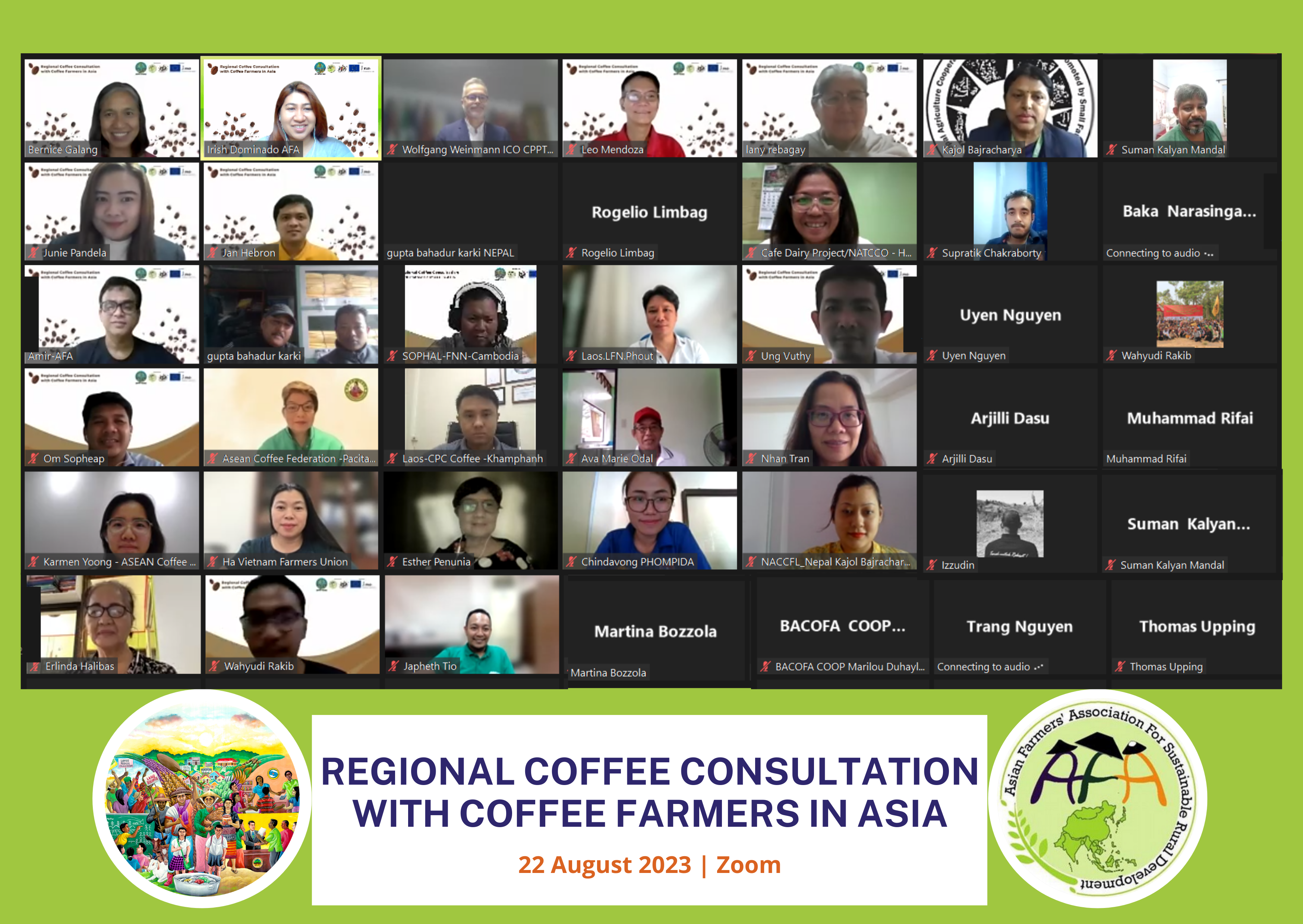Introduction
We, the members and partners of the Asian Farmers’ Association for Sustainable Rural Development (AFA), representing the small-scale coffee producing communities across 7 Asian nations – Cambodia, India, Indonesia, Laos, Nepal, Philippines and Vietnam – have convened last 22 August 2023 to deliberate on the potential ramifications of the European Union Deforestation Regulation (EUDR) for smallholder coffee producers. AFA, an established regional alliance of 22 national family farming organizations spanning 16 countries with a combined membership of around 13 million small-scale farmers, including women, men, and youth, is committed to fostering solidarity, amplifying collective voices, and empowering our members as pivotal contributors to sustainable rural development. We express deep apprehensions about the repercussions of the EUDR, particularly on smallholder coffee producers in Asia.
Key Role of Small Scale Coffee Farmers
The global coffee industry, valued at over $400 billion, is predominantly driven by 25 million smallholder producers who collectively account for 80% of total coffee production.
Moreover, we play a critical role in averting deforestation. Studies have shown that the small-scale coffee producers are espousing environment friendly technologies (e.g. shade-grown coffee trees in agroforestry and intercropping systems) that do not endanger the forest.
Our Concerns
Yet the grim reality is that 5 million, or 20% of these smallholder coffee farmers subsist on less than the international poverty line benchmark of $3.20 per day. We are already grappling with the multifaceted challenges of extreme weather disruptions impacting our yields, escalating input costs due to local and global economic events, and the enduring struggle to earn a dignified livelihood.
At the farm level, compliance with the EUDR can increase our costs, especially since our incomes are already declining primarily due to reduced productivity in coffee cultivation, in addition to rising production and transportation costs, inadequate infrastructures, and lack of technical and marketing capacities of individual farmers and cooperatives. Moreover, the EUDR can constrict our market opportunities since our countries have inadequate policies and measures aligned with EUDR, risking further our marginalization.
Our Recommendations
We would like to call upon the policy makers of coffee producing and coffee importing nations to give due regard to our following recommendations:
1. To our governments :
- Assist small-scale coffee farmers in adhering to the EUDR. We ask governments of coffee producing countries to extend comprehensive support to small-scale coffee farmers by crafting policies that enable coffee competitiveness in the EU market. This will include ensuring right to lands and forest resources of small-scale coffee producers, building the latter’s capacities for producing and processing coffee sustainably as well as in their stronger involvement in the coffee value chain, bolstering market infrastructure, establishing robust market connections, introducing targeted subsidies and involving them in policy formulation.
- Establish a mechanism to remunerate small-scale coffee farmers for their forest conservation efforts while providing sanctions to those responsible for deforestation.
- Facilitate access to deforestation data necessary for product traceability, thereby ensuring transparency.
2. To big coffee companies, traders and processors: Serve as the key partner in assisting small scale coffee farmers to counterbalance the potential negative impacts of the EUDR, by providing the necessary support to coffee producers, by complying to EUDR and by promoting entry to the EU market. Private financial institutions are encouraged to provide market-oriented financial access to small producers, empowering them to enhance productivity and product quality.
3. To global and local coffee industry associations: Safeguard the economic well-being of small scale coffee farmers from the adversities and risks posed by the EUDR to our sector. Actively involve small farmers’ organizations in shaping EUDR-related policies, regulations, and guidelines.
4. To development financing from public and private sectors: Provide direct financing to farmers organizations and cooperatives to strengthen our capacities for aggregation; for sustainable production, processing, value addition and marketing/distribution of coffee; for establishing viable enterprises as coffee operators and traders ; for engaging policy makers for favorable policies ; and for claiming programs and benefits due to small scale coffee farmer as rights-holders in our countries.
Our Commitment
We affirm our unwavering commitment to supporting our member and partner small coffee farmers through our organizations. We pledge to conduct educational campaigns to deepen farmers’ understanding of the EUDR, its potential drawbacks, and opportunities for promoting climate adaptation. We commit to strengthening our capacity to aggregate the products of our farmers as well as provide processing facilities, qualifying us as capable coffee operators and traders, thus ensuring small farmers’ welfare is duly addressed. Furthermore, we express our determination to engage in both local and international industry associations, as well as other relevant bodies connected to the coffee sector, representing the voice of the small farmers.
LONG LIVE FAMILY FARMERS! NO FARMER, NO FOOD! NO FUTURE!




Comments are closed